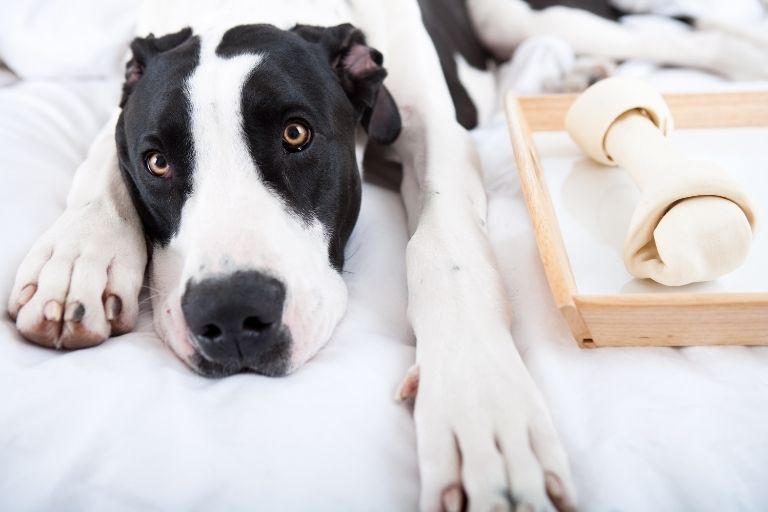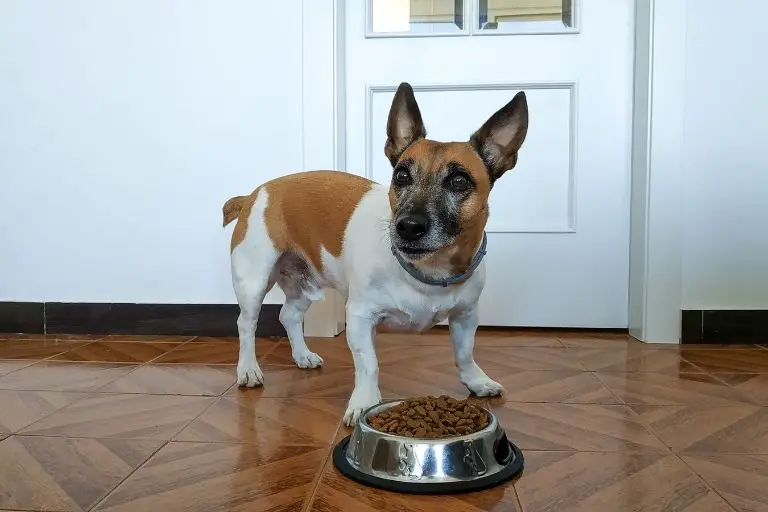When your dog suddenly loses their appetite, yours can disappear as well. You’re alarmed, pondering what’s behind your dog not eating but drinking. “Could it be illness?” you wonder. “Maybe something has upset my dog,” you consider, reviewing your recent activities.
Your thinking is on the right track. Still, there are more possible triggers for your pup refusing meals. In this post, you’ll learn about the range of causes. In the process, you’ll gain clues to your dog’s worrisome behaviour.
Still, you may need to consult a vet to determine what’s wrong. Once you know for sure, you can safely correct the problem. Soon your dog should be back to their happy self, eating so much better.
Table of Contents
- Why Dogs Won’t Eat
- 2. Impaired Digestion
- 3. Dental Problems
- 4. Emotional Distress
- 5. Other Medical Causes
- Warning
- Eating Happily!
- FAQs
Why Dogs Won’t Eat
1. Food Concerns
New Diet
Have you switched to a new pet food? Even if it’s healthier than the prior one, your pup may not like it.
If you suspect this is true, give your dog the former food. If they scarf it down, there’s your answer! Still, if you want to improve your dog’s diet, you might call a vet. The doctor can suggest nutritious foods dogs love.
Another factor to consider is food temperature. Cold can alter food flavor and texture, making it less appealing. In that case, before serving meals, warm them slightly.
Stale Kibble
Does your pup eat dry pet food? If so, it could be spoiled. Check the package expiration date, along with the kibble’s colour and smell. If the expiry date has passed or the food seems stale, discard it.

Bad Feeding Habits
Maybe your pup has become finicky. This is likely if you give too many treats or routinely offer table scraps. Hence, your dog refuses pet food, thinking you’ll cave to their pleading eyes.
Are you guilty? Hey, there’s no judgment here. I’m your ally! Still, for your dog’s health, you need to set some rules. That means limited treats and no more begging for what you eat.
Pet Food Transitioning
If you want to try a different dog food, do so gradually, over 10 days. Here’s a sample schedule to follow.
- Day 1 to 3 – Mix ¾ prior food with ¼ new food.
- Days 4 to 6 – Mix half and half.
- Days 7 to 10 – Give ¾ new food with ¼ prior formula.
- Thereafter – Feed only new food.
While transitioning, if your dog has constipation or diarrhea, cut back on the new formula. Should feeding problems continue, call your vet for advice.
2. Impaired Digestion
If your dog’s tummy is often upset, they may shy away from food. A vet should evaluate frequent digestive problems. This way, you’ll know whether a medical condition is at fault.
Scant Good Bacteria
If not, your pup could be low in probiotics, healthful microbes living in your dog’s large intestine. Such bacteria have several health benefits. Among them are slaying infectious germs, synthesizing nutrients, and breaking down food. By this, probiotics ramp up your dog’s immunity.
Note that good bacteria are destroyed by antibiotics, parasites, stale food, and stress. In turn, dying colonies can trigger:
- diarrhea
- indigestion
- excessive gas and bloat
- food allergies
- bad breath
Solution
If your dog gets sick often, give them a probiotic supplement. Daily use will bolster your dog’s beneficial bacteria. As the colonies enlarge and thrive, they’ll promote better digestion and overall health for your dog.
Low Digestive Enzymes
Poor digestion can also stem from an enzyme deficiency. Signs of a shortfall include:
- stomach rumbling
- repeated burping
- bad breath
- bloat and passing gas
- diarrhea, vomiting, and constipation
- stinky stools
- stools with undigested food
While dogs self-produce digestive enzymes, this ability wanes with age. Additionally, heat kills the enzymes in fresh food. Thus, heat-processed pet food lacks enzymes.
Certain canine disorders, such as pancreatic disease, cause enzyme deficiency. Shortfalls are also linked to ear infections, skin conditions, food intolerance, and food allergies.
Hence, an enzyme supplement may improve your dog’s digestion, and in turn, their appetite.
Solution
If your vet approves, try giving your dog digestive enzymes. Even better is pairing them with a probiotic supplement.
Based on my research and firsthand experience, I recommend this product, suiting dogs age 3 months and older. It’s completely natural, formulated in consultation with veterinary nutritionists.
Moreover, it contains probiotics! As such, it reduces intestinal inflammation and gas, fostering better digestion and normal stools.

Supplement Guide
This is a powdered formula, mixed with your dog’s food each day. So, you’ll need to coax your pup to eat.
When first giving the supplement, be conservative. Your dog’s digestive tract needs time to adjust to the probiotic bacteria. A hefty dose could trigger bloating and diarrhea.
Start with one teaspoon of the powder, mixed with a healthy food your pal typically loves. If the initial dose goes well, add one teaspoon to your dog’s food daily. Once your pup is eating normally, follow the dosing instructions on the supplement package.
What if your dog still won’t eat, not even their favourite food? In that case, vets recommend easily digested fare, particularly:
- bone broth
- pure meaty baby food, without flavourings
- white chicken meat and white rice
- sweet potatoes or unseasoned pumpkin, not pie filling
If your pup has no interest in food whatsoever, spread some baby food on their mouth. A few licks should entice them. Then, after each meal, praise your pup until they’re eating well consistently.
Feeding Conditions
Make meals pleasant for your pal by ensuring a quiet, comfortable setting. If your dog is short or a senior, serve their food at shoulder height on a raised surface. This way, your pup can avoid muscle strain.
Also, before giving food and water, wash the bowls thoroughly. Any old food or soapy residue will sour your dog’s appetite.
3. Dental Problems
If your dog has poor oral health, it can escape your notice until it’s severe. Obvious signs are discolored teeth, stinky breath, and chew toys tinged with blood.
Does your pup flinch when you pet their head? This can signal mouth soreness. If chewing and swallowing hurt your dog, eating may be too painful.
Professional Care
Has it been more than a year since your dog saw a vet? If so, make an appointment. An oral exam with x-rays will reveal gum disease and loose or broken teeth. If present, a vet will perform a dental cleaning and oral surgery under general anesthesia.
The doctor may also prescribe dental pellets, dry food that cleans your dog’s teeth while chewing.
Home Care
To promote dental health, give your dog soft rubber toys to chew. Vets say to avoid stiff toys, hard treats, rigid rawhide, and animal bones, both cooked and raw. Also hazardous are tennis balls. Their surface fuzz will erode your dog’s teeth.
4. Emotional Distress
Abrupt changes in your dog’s life can dampen their appetite. Examples are moving to a new home, the death of a family member, and the addition of a new baby or pet. Also upsetting are loud noises.
Are you not home as much as before? If so, your pup may miss you terribly, dulling their appetite.
If skipping meals is stress-related, your dog will show other restless behaviours. For instance, they may repeatedly lick, chew, or bite their paws. Or they might persistently whine, growl, or bark.
Has your dog started sleeping all day? In that case, they may be depressed. Such sadness can have a psychological or physical root, such as a hormonal imbalance.
Separation Anxiety
Deep-rooted insecurity can prompt “separation anxiety.” Here’s one sign.
Let’s say you’re preparing to leave the house. You’re sitting on the couch, putting on your socks and shoes. Suddenly, your dog tries laying on top of you.
Then, upon returning home, you find a soiled floor or household destruction. Or perhaps your dog is hiding. All these behaviours point to separation anxiety.
Consoling Your Dog
If you can trace your dog’s fasting to a lifestyle change, lavish your pup with extra affection. Regarding the troubling situation, try to resolve or reduce its impact on your dog.
Also, consider giving your pup a relaxing supplement, such as All Natural Tranquillity. This liquid herbal formula will calm your cutie without inducing drowsiness.
It’s easy to use. With the included dropper, squirt the liquid into your dog’s mouth. Here, customers praise the pacifying effects of All Natural Tranquillity.
Handling Separation Anxiety
One option is using “pheromones.” Nursing dogs make these chemicals during weaning. Synthetic pheromones likewise comfort jittery dogs. Manufacturers add them to pet products, such as sprays, wipes, and collars. Also helpful for separation anxiety is All Natural Tranquillity.
What if your pup lays on you, protesting your leaving home? In that case, line your dog’s bed with a sock or T-shirt you’ve recently worn. Your scent on the clothing will help your dog feel secure. This article further explains why some dogs lay and sleep on their owners.
If your pup continues to panic when alone, consult your vet. There may be a medical problem, the discomfort frightening your dog.
Should the doctor find nothing physically wrong, hire a pet behaviour counselor. The therapist will help your dog adapt to your absence. Ask for a professional referral from your vet. You can also find UK pet therapists with this search tool.
5. Other Medical Causes
Additionally, refusing food can stem from other health problems. Examples are parasites, infections, kidney disease, bowel obstruction, and cancer.
So, if your dog hasn’t eaten in two days and they seem ill, promptly bring them to your vet. Symptoms mandating urgent assessment include vomiting, diarrhea, and lethargy.
Medications and vaccines can also flatten a dog’s appetite. So, after giving a new drug, monitor your pup for side effects. If any arise, including appetite loss, call your vet.
Another consideration is poisoning, evidenced by diarrhea and vomiting. Call Poison Control if your dog has ingested something toxic. Common clues are:
- chewed medicine bottles
- ravaged houseplants
- toppled containers, oozing chemicals
Is your dog a senior? If so, sensory loss may weaken their appetite. As dogs age, their ability to taste and smell diminish.
Warning
Now, let’s talk about your dog drinking lots of water and not eating. Excessive water intake can flag a medical problem, such as diabetes. This is another reason why your dog should see a vet for a diagnosis.
If your dog stops drinking water, it’s a medical emergency. For canines, a single day of no water can be fatal. To avoid dehydration, your dog needs an ounce of water per pound of body weight each day.
Eating Happily!
Thus, your dog’s disinterest in food could stem from:
- poor digestion
- dental problems
- food issues
- stressful lifestyle changes
- separation anxiety
- vaccines and medications
- diseases and parasites
- poisoning
Additionally, a dull appetite can signal other medical problems. If your dog hasn’t eaten in two days, bring them to your vet.
Be sure to track your pup’s water intake as well. Going one day without water can kill a dog.
Note that tummy troubles can resolve with certain supplements. If your vet approves, try giving probiotics and digestive enzymes. I recommend this reputable product. Anxiety can ease with using pheromones and All Natural Tranquillity.
Once your dog is eating well, treat yourself to a gourmet meal!
FAQs
Dogs can have variations in their appetite from day to day. If your dog skips a meal occasionally but is otherwise active, playful, and maintaining their weight, it might not be a cause for immediate concern. However, if your dog’s lack of appetite persists or is accompanied by any of the following signs, it’s time to consult a veterinarian.
Treating a dog that is not eating involves addressing the underlying issue causing the reduced appetite. It’s always best to work closely with your veterinarian to determine the best course of action for your dog’s individual needs.





